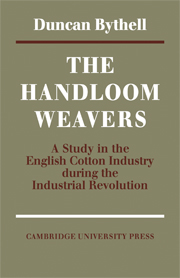Book contents
- Frontmatter
- Contents
- Preface
- Introduction
- Map of the weaving towns and villages of north-east Lancashire in 1821
- 1 Problems and sources
- 2 The organization of the industry
- 3 The labour force
- 4 The coming of the powerloom
- 5 Wages: (I) The piece-rate
- 6 Wages: (II) Earnings and the standard of living
- 7 Public opinion and the handloom weavers
- 8 Organized industrial action among the cotton handloom weavers
- 9 The weavers and radical politics
- 10 The problem of poverty
- 11 Displacement and disappearance
- Appendix 1 Some piece-rate series
- Appendix 2 The piece-rate and the price of food
- Appendix 3 G. H. Wood's estimates of average weekly earnings
- Bibliography
- Index
Introduction
Published online by Cambridge University Press: 07 October 2011
- Frontmatter
- Contents
- Preface
- Introduction
- Map of the weaving towns and villages of north-east Lancashire in 1821
- 1 Problems and sources
- 2 The organization of the industry
- 3 The labour force
- 4 The coming of the powerloom
- 5 Wages: (I) The piece-rate
- 6 Wages: (II) Earnings and the standard of living
- 7 Public opinion and the handloom weavers
- 8 Organized industrial action among the cotton handloom weavers
- 9 The weavers and radical politics
- 10 The problem of poverty
- 11 Displacement and disappearance
- Appendix 1 Some piece-rate series
- Appendix 2 The piece-rate and the price of food
- Appendix 3 G. H. Wood's estimates of average weekly earnings
- Bibliography
- Index
Summary
No other group of workers in the history of the English working classes has received more sympathy and less scholarly attention than the handloom weavers of the Lancashire cotton industry during the industrial revolution. Always in the cast, but rarely on the stage, they are mentioned, without close scrutiny, in every book on the industrial revolution. Although the leading example of technological unemployment during English industrialization, their heads have never been accurately counted. Although the most quoted example of deteriorating living standards, their wages have never been exactly computed. Although an alleged prime source of radical discontent and action, their role in politics has never been fully analysed. Indeed, Mr Bythell's study is the first booklength and detailed examination of the handloom weavers—their numbers, their varying history of employment, their standard-of-life, their industrial and political actions, their displacement and disappearance. This is surely strange? And even stranger when one remembers that so much of the best English economic history has come out of Manchester, from the pens of a long line of distinguished historians from Unwin to Ashton, and that much of this writing has been concerned with the industrial revolution. Yet no Manchester historian took up the history of the handloom weavers.
It is fitting, even at this late date, that the first full-length study should come from Lancashire. Mr Bythell was born and schooled in Lancashire, before going to Wadham College, Oxford, to read history and subsequently to write the thesis which is this book.
- Type
- Chapter
- Information
- The Handloom Weavers , pp. xi - xiiiPublisher: Cambridge University PressPrint publication year: 1969
- 1
- Cited by



